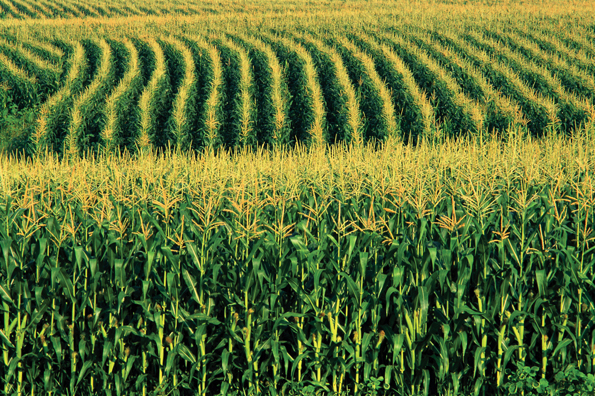July 23, 2012 – 7:00 p.m. – Extension Board Meeting, Extension Office, York
August 2-5, 2012 – York County Fair, check it out at: http://www.yorkcountyfair.com/
August 23, 2012 – York County Corn Grower Plot Tour
Cropping Update
It’s been another week of the same old hot, dry weather with no rain!  I traveled to our National Extension Educator Annual Meeting/Professional Improvement Conference last week in Charleston, South Carolina expecting the worst for heat and humidity and it was actually hotter and much drier here in Nebraska compared to the Charleston area.  Temperatures were only in the low to mid-ninety’s.It’s sure been a long irrigation season and we’ve had another week of ETgages readings that have been above 2.0â€!  This makes five for the season already, while the past several years we’ve only had a couple annually!  The ETgages that I’ve been monitoring dropped   have dropped between 2.0 – 2.2†for the week and averaged 2.1â€.   The corn in the fields I’m monitoring is in the late dough stage and just beginning to dent (I harvested an ear early in the morning Monday and by 10:00 a.m. I could see if beginning to dent on the shank end of the ear), while the soybeans are in the late R4 stage, the crop coefficient for these stages of corn and soybeans continues to be 1.1, so we multiply 2.1 times 1.1 for a total crop ET of 2.31†or about .33â€/day!  Hopefully we will be seeing an end to triple digit temperatures soon?
Since the crops have been maturing, I’ve received a couple calls about scheduling that last irrigation of the season.  The last few years we’ve encouraged producers to leave room for rainfall and not finish the season with a full profile.  That should be easy this year, we just have not had many breaks where we could shut those systems off, but as the crop begins to reach maturity, the crop water use will begin to slow.  I checked out our NebGuide “Predicting the Last Irrigation of the Season†and the crop water use and time to maturity for corn and soybeans follow:
Corn
Stage of growth Approximate days to maturity Water use to maturity
R4 or Dough 34 7.5
R4.7 or Beginning dent 24 5.0
R5 ¼ milk line 19 3.75
½ milk line 13 2.25
¾ milk line  7 1.0
R6 Physiological maturity   0 0.0
Soybeans
R4 Â End of pod elongation 37 9.0
R5 Â Beginning seed enlargement 29 6.5
R6 Â End of seed enlargement 18 3.5
R6.5 Leaves begin to yellow 10 1.9
R7  Beginning maturity   0 0.0
If you’d like to see more details about these stages of maturity, check out the NebGuide at: http://www.ianrpubs.unl.edu/epublic/live/g1871/build/g1871.pdf.  If you have a full profile, our soils will hold about 1.1â€/foot so for a 3 foot profile if we draw it down to 60% depleted, we have about four inches of water that we can utilize!  Hopefully we’ll also get some rain before the end of the season, but only time will tell!
I and our technology staff are working on an app for IPhones and I Pads that helps calculate the amount of soil water you have based on your Watermark sensor readings.  If should be available by the end of the season, but we also do have charts that  do the same thing on our NAWMN webpages: http://water.unl.edu/web/cropswater/nawmdn.
With readings of around 150 you’ve used up most of the available moisture to that 50% level that we want to maintain during the heart of the season.  As we near the end of the season, we can push the threshold to 60%.  Those readings would be around 200 or more!
It’s also important to remember that if your readings are 33 or less, you have a full soil profile and have at least 1.1†or more of soil water available for your crops!  Give me a call if you have any questions or check out our irrigation resources at the link above!
Drought Information
UNL has updated developed a webpage for drought related information. Â That website is: http://droughtresources.unl.edu/. Â Information on this site pertains to both livestock and crop producers. Â In addition, the CropWatch website also has lot of valuable cropping information related to drought and our current conditions, that address is: Â http://cropwatch.unl.edu/.
Do you have drought damaged corn which could be swathed and baled, chopped, or grazed?  If you do and want to list it on the Nebraska Hay and Forage Hotline, it’s available free of charge for buyers and sellers to list feed resources. Call the hotline at 1-800-422-6692 to list the forage you have or to list your need for forage.
Bruce Anderson, Extension Forage Specialist, has prepared some information about the options for drought or weather-damaged corn. Â He recommends that silage may be the safest method of harvest as fermentation usually (but not always) reduces nitrate levels and risk. Yield is about one ton per acre of silage for each harvested foot of earless corn plant (not counting the tassel). Feeding value is about 70% to 80% of well-eared corn silage. Corn with some grain (less than 50 bushels) tends to produce about one ton of silage for every five bushels of grain with a feed value about 80 to 90% of regular corn silage.
Harvest timing is important with silage to ensure the correct moisture for proper fermentation. Plants probably are about 80% moisture now and the desired moisture level for silage is about 65%. Â Plants with any green leaves usually are too wet to chop for silage. For proper moisture, most leaves may need to be dead before chopping. The stalk and ear hold amazingly high water concentrations. For corn with no grain, even if all leaves are dead, the whole plant (and silage) moisture can be 70% if the stalk is still green and alive. Once plants actually die they can rapidly dry down.
Green chopping could be the most dangerous method of salvaging corn as nitrates can convert to nitrites rapidly which are 10X more deadly. Â Only chop enough for one feeding and clean out bunks of any left-over corn that remained overnight. Â Go to this link for the entire article that Bruce Anderson and Tom Dorn, Extension Educator prepare in the July 12th issue of CropWatch: http://cropwatch.unl.edu/web/cropwatch/archive?articleID=4926217.
We also have a NebGuide prepared by Bruce Anderson, Tom Dorn and Rick Rasby that answers questions related to the value and use of drought-stressed corn? That NebGuide is called “The Use and Pricing of Drought-Stressed Corn†and  is available at our office or on line at: http://www.ianrpubs.unl.edu/epublic/live/g1865/build/g1865.pdf.
I hope you’ll check out all those resources or if you want any of this info, stop by our office, we’ll make it available to you!
Fair Volunteer!
What’s your schedule look like the next few weeks?  If you’d like to volunteer at the York County Fair or at the Nebraska State Fair it’s not too late!  We can sure use extra helpers in Ag Hall on Wednesday August 1st as we enter, judge and exhibit the many 4-H, FFA and open class entries.  If you have time, call me at 402-362-5508, or email me at gary.zoubek@unl.edu.  It’s not a big commitment and it’s a lot of fun seeing all the various entries!
Last week I mentioned that they’re looking for volunteers to help with the Nebraska 4-H program at the State Fair.  They’re seeking volunteers to help with exhibit entry day, judging, and serving as 4-H exhibit building hosts and greeters. Volunteers will be needed for educational activities in the 4-H building, serving as the Lil’ Green Mascot and assisting with all 4-H contests and events throughout the fair.  State Fair 4-H volunteers will receive a fair pass for the day(s) they volunteer.
Volunteers can sign-up by visiting http://4h.unl.edu/becomevolunteer or by contacting your local extension office. A complete list of volunteer opportunities is also available on the site. Â If you have questions about being a 4-H volunteer at the Nebraska State Fair, please contact Cathy Johnston at 402-472-9024 or by email at: cjohnston1@unl.edu.
It’s Almost Fair Time!
I hope you’ll take a little time next week to visit the York County Fair this week!  This year’s theme is “Rock with the Stockâ€, so I hope you will Rock on Out!  The Fair board has a great fair planned!
For many of our 4-H and FFA youth the county fair as well as the state fair are what they’ve been working towards all year!  It’s a great time to showcase their project at the county fair and if selected the state fair.  Competition and evaluation is part of the learning experience, but only a small part.  Hopefully it’s the learning along the way; the friendships made that will stay with these youth a lifetime.
For many families it’s a family affair.  I know several families that take vacation the week of the fair so that they can be involved.  It’s a great opportunity for parent to spend time with the youth as well as the youth spending time with family and other 4-H & FFA members.  In addition, many grandparents, aunts and uncles, other relatives and friends come to the fair to see the exhibits and watch the youth participate.
What I like to see is the youth sitting around visiting and having fun as well as all the alumni back. Â For many it may be the only time each year that they see each other.
Fair does not have to be just the youth creating memories, how about entering something in the Open Class division.  We will be taking entries Tuesday evening July 31st  6:00 – 8:00 p.m. and Wednesday August 1st from 8:00 – 12:00 a.m.  Take those entries to Ag Hall!
Next week I’ll share info about the many activities that are taking place, but we’ll be starting this week with horticulture judging contest this Friday at July 27th at 1:30 p.m., the 4-H Rifle/Pistol contest at 7:00 p.m. on Saturday July 28th, the 4-H BB Gun contest at 1:00 p.m on Sunday July 29th, the 4-H Trap Shoot at 2:00 pm. on Sunday at 2:00 p.m.!  The 4-H Style Revue will be Monday at 7:00 p.m., the 4-H Bic Rodeo is at 9:00 a.m. on Tuesday July 31st with the casting contest at 11:00 a.m. and the Dog Show at 4:00 p.m.
Watch for more details next week! We’ll see you at the fair! Check it all out at: http://www.yorkcountyfair.com/.


































